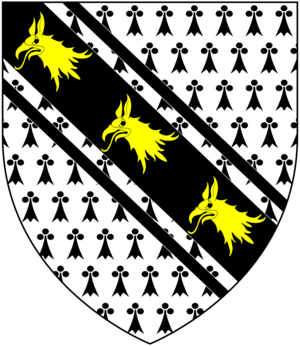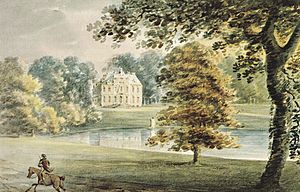Sir Walter Yonge, 3rd Baronet facts for kids
Sir Walter Yonge, 3rd Baronet (1653 – 18 July 1731), was an important English landowner and politician. He lived at Escot in the area of Talaton, Devon. Sir Walter was a member of the English and British Parliament from 1679 to 1710. He belonged to the Whig political group.
Early Life and Family
Walter Yonge was born in 1653 and was baptized on September 8th. His father was Sir Walter Yonge, 2nd Baronet, who lived at Great House in Colyton, Devon. His mother was Isabella Davie.
In 1670, when his father passed away, Walter inherited the title of Baronet. This meant he became Sir Walter Yonge, 3rd Baronet. He also went to Exeter College, Oxford, in the same year.
In 1677, he married Gertrude Morice. Her father was Sir William Morice, 1st Baronet. Around 1680, Sir Walter built a new, grand home called Escot House in Talaton, Devon. A famous architect named Robert Hooke designed it. Sir Walter preferred Escot to his family's older home, Great House.
Political Career
Sir Walter Yonge became a Member of Parliament (MP) for Honiton in 1679. An MP is a person chosen to represent a group of people in the government. He served as an MP for Honiton until 1689. After that, he was an MP for Ashburton for a short time.
He returned to represent Honiton in 1690 without anyone running against him. Sir Walter was a Whig, which was one of the main political groups at the time. He often spoke in Parliament and helped write many new laws, called "bills." He also helped count votes for his political group.
In 1691, he married his second wife, Gwen Williams.
Sir Walter was re-elected for Honiton several times without opposition. He showed his loyalty to the king and voted on important issues, like the price of money. He also voted on a special law against Sir John Fenwick in 1696.
He continued to support the government and was re-elected in 1701. Later that year, he gave up his job as a customs commissioner so he could keep his seat in Parliament. He was often involved in counting votes for the Whigs.
From 1702 onwards, Sir Walter was less active in Parliament, but he still voted on important matters. He was re-elected in 1705 and supported the government's choices. In 1708, he was re-elected for Honiton again. He continued to help with new laws and vote counts. In 1710, he voted to remove Dr. Sacheverell from his position.
After 1710, Sir Walter did not run for Parliament again. However, in 1714, he became a Commissioner of Customs once more. He held this job for the rest of his life.
Later Life and Death
Sir Walter Yonge passed away on July 18, 1731. He was buried in Colyton. He had one daughter from his first marriage and a son and three daughters from his second marriage. His son, Sir William Yonge, became the 4th Baronet after him.
 | Misty Copeland |
 | Raven Wilkinson |
 | Debra Austin |
 | Aesha Ash |



